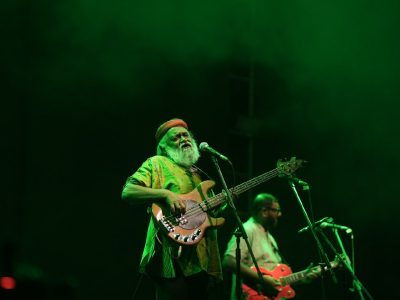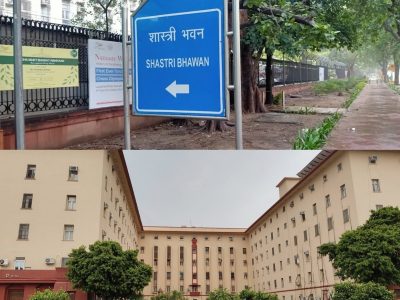Samsara – Enter the Valley of the Gods is a debut novel by Saksham Garg that explores the lives of Aman Chandra and ten other souls of Samsara when they are kidnapped from modern-day India and transported to a hidden valley in the Himalayas. The high fantasy novel is a journey of these souls who have to learn the ancient yogic art and mysteries of the ancient world in order to survive. Shashi Tharoor calls the novel a creative and entertaining read that brings life to a world of Indian mythology and fantastical adventure.
Patriot talks with Garg, who is also an editor at Penguin Random House India, to know more about his own journey with his fantastical world of gods and beasts.
Q: Please tell us about your debut novel.
A: Samsara is a first-of-its kind mythological fantasy thriller that is set in modern-day India. Ten souls are kidnapped from different parts of the country to a mythical valley hidden deep in the Himalayas, where ancient gods and mythical creatures reside. The Souls must adapt to the ways of the valley, learning yogic sorcery and the core tenets of Hinduism, culminating in a treacherous journey that will determine not just their fates but that of the entire nation.
Q: What was the inspiration for the book?
A: Other than fantasy, Samsara has at its core modern demonstrations of the forgotten, ancient tenets of Hinduism. My curiosity about our history started in Woodstock School, Mussoorie, where I was exposed to an Anglicized perspective on the religion. Wendy Doniger’s translation of the Vedas was a stark contrast to the Indian translations I read later. But what they all had in common were the original gods—Indra, Agni—and the core tenets of Hinduism that are now little remembered and followed—Samsara, moksha, ahimsa, etc. Through Samsara, I have tried to resurrect these values in the hope to start a dialogue about the state of the religion in our nation today, and how we can realign our religious compass to build a peaceful, liberal and inclusive society.
Q: You have worked as an editor at Penguin and are now a published author with Penguin. How has this journey been?
A: Honestly, it was the other way round. I entered the world of editing because of the writing journey I had already embarked upon. You see, 10 years ago, as a grade 12 student—after reading Harry Potter and Percy Jackson for the nth time—I started working on Samsara, India’s response to these great fantasy series. Attending Hindu College, Delhi University, I was constantly working on multiple drafts and rewrites while completing my Economics degree. After graduating, I came to the realization that if I truly wanted to do justice to my book and emulate the inspiring authors we all grew up reading, I would need to see the publishing world from the inside. And thus I found my way to the Penguin Random House India editorial team—with a brief internship at Siyahi, a literary consultancy. The four years of experience at Penguin India completely transformed my understanding of writing, and having worked on multiple high-profile titles as an editor, I learnt invaluable lessons about how to take the potential of the ideas I had and restructure the narrative to make it more approachable to the current generation of readers. With a final rewrite and multiple edits, Samsara has finally found its current form.
Q: Are any of the characters based on people you know?
A: While no character bears a perfect resemblance to people or mythical beings in real life, I have borrowed some interesting or quirky character traits from the many people and fictional characters I came across in my ten-year writing span – and they know who they are. I can only apologize and say ‘thank you’ to them, and hope that they feel amused or perhaps excited to be featured in the book in this small way.
Q: Have any real-life experiences inspired the events in the book?
A: I truly believe that the best stories are those that can blend the real with the imaginary in such a complex weave that one does not know where truth ends and fiction begins. My admiration for the understated power of yogic practices came from my grandfather, Dinanath Garg, who has spent a large part of his life practising meditation. The sacred texts of Hinduism — the Rigveda above all — were instrumental for research, to aid some authenticity to this mystical valley. But a lot of it has been adapted and imagined anew to serve the narrative of the story — the aim was to create a new series of mythological fantasy stories that people can be inspired by to give voice to their own ideas, rather than rehash the often-told and repeated-to-death stories that pervade the mythology space to a large extent.
Q: You invested ten years into your debut novel. There must have been several challenges you faced in this period. How did you overcome them?
A: The biggest challenge was balancing the different aspects of daily life and carving out time to write. The multiple rewrites make me feel as if I’ve written a lot more than one book, and that required many early morning sessions every day over the last ten years. As I grew older, upskilling my understanding of writing, many sacrifices—health, social life, work—were made to ensure that Samsara had the best I had to offer throughout the different stages of its journey.
Q: What kind of research did you undertake to capture the essence of mythological fantasy?
A: Tons. Tolkien and Patrick Rothfuss for the prose. Guy Gavriel Kay for the mix of modern and the magical. Immortals of Meluha as well. But most importantly, the sacred texts of Hinduism—the Rigveda above all. And finally, for the spirituality-derived magic system in the novel, my grandfather.
Q: How relatable is the protagonist Aman Chandra to the readers?
A: Aman Chandra is an eighteen year old social misfit who has struggled with expressing his thoughts and feelings to anyone around him, having been shunned from society after his father ‘betrayed’ the Indian Army on his final mission. For many of us who struggle to trust others in our life and keep our innermost thoughts to ourselves, Aman serves as a lens through which the reader can feel the power of genuine friendship and companionship to rescue a person from being trapped in their own thoughts.
Q: Your book has been termed as India’s answer to Harry Potter. How have you received this defining review?
A: To be perfectly honest, I actively tried to distance myself from the comparison to Harry Potter, insofar as going out of my way to edit the narrative devices in the early chapters. However, the defining comparison, in my humble opinion, comes from the painstaking effort I took to immerse myself into the world of Vanyasa. It is that detail and mystical allure that I hope my very talented endorsers, and early readers, picked up on to make the ultimate comparison. In some ways, this book was a way to get over that letter from Hogwarts that I never received, and I hope readers find that closure too. And most importantly, I hope it leaves them wondering about the idea of God, its creation, and the weight it carries in our world today.
Q: Does the book have any similarities with the Harry Potter series – in terms of characters or plot?
A: In some ways yes, in others not so much. I would say that the timespan of Samsara coincides with that of each Harry Potter book, with the events taking place over the duration of a year. However, I really wanted to create a novel that could introduce international readers to the wonderful expanse of ancient Indian and Vedic mythology—a collection of texts that has for too long remained an understudy to the far more popular Greek and Egyptian mythologies, that are globally revered. Perhaps Samsara could be described as an amalgamation of Percy Jackson and Lord of the Rings in that respect!
Q: Did you look up to any authors or personalities while writing the book?
A: Apart from Tolkein and Rothfuss and other such writers, I was also inspired by the recent wave of powerful female protagonists from Indian mythology who are receiving their due recognition through authors like Anuja Chandramouli (Ganga; Mohini; Shakti), Vaishnavi Patel (Kaikeyi: A Novel), and Amish (Sita – Warrior of Mithila), to name a few.
Q: What do you think of the existing literature in the mythological fantasy genre in India?
A: As an editor at Penguin I have had the pleasure of commissioning and editing multiple high-profile titles, including some very engaging books in the mythological fantasy genre. I believe that the diversity of characters our folklore contains is a testament to the diversity that exists in our country, and to see a manifold increase in the number of authors entering this space in the last decade or so is encouraging to say the least. At the same time, I have tried to use a different approach to my work, sticking with the fundamentals of world-building and original characteristisation for the most part to try and install Samsara as a story that may find its audience even amongst the readers of epic fantasies like A Song of Ice and Fire, Wheel of Time or The Kingkiller Chronicles.
Q: For the debut authors who are reading this interview, how has the support from your friends, family, and peers helped and motivated you? Is there anything you would like to tell them as a debut author yourself?
A: Quite simply put, the book that you hold in your hand today would not exist without the support of my friends, teachers, mentors, colleagues and most importantly my family. In many ways they have put my interests above their own and intervened at the most critical moments to ensure that Samsara never suffered for lack of time, care, and love. They have been my rock and I owe everything that this book may come to achieve to their perseverance and undying encouragement. I hope that readers can feel the magic of Samsara transform them, just as I did while writing it.
Q: Lastly, what message would you give to the readers?
A: I hope they leave a part of themselves in Vanyasa, the magical world in the novel—feel that desire to want to live in it. In some ways, this book was a way to get over that letter from Hogwarts that I never received, and I hope readers find that closure too. And most importantly, I hope it leaves them wondering about the idea of God, its creation, and the weight it carries in our world today.
Samsara is part of a trilogy and I’m currently working on the second book in the series. My writing journey has just begun, and I’m excited to see where Samsara takes me.
Follow us on:
Instagram: instagram.com/thepatriot_in/
Twitter: twitter.com/Patriot_Delhi
Facebook: facebook.com/Thepatriotnewsindia





